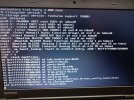Hi!
Brief description of the problem:
When booting Thinkpad T440p, I see the error shown at the attached photo. The error only occurs if the laptop is plugged into a power outlet using an adapter. No error occurs when running on battery power.
Thus, the system can only be booted when running on battery power.
Detailed description:
1 - Any ideas?
2 - Your opinion, will it be possible to make ZFS mirror using system 2.5 hdd + 2.5 caddy hdd on t440p's? It was for this that I started everything with t440p, not at all expecting a catch at such an early stage.
Thank you!
Brief description of the problem:
When booting Thinkpad T440p, I see the error shown at the attached photo. The error only occurs if the laptop is plugged into a power outlet using an adapter. No error occurs when running on battery power.
Thus, the system can only be booted when running on battery power.
Detailed description:
- There are several t440p's different models: i5/i7 with or without Nvidia. These laptops were produced in 14/15 but are almost new.
- Error occurs on all these laptops.
- Tested with various genuine power adapters (65/90W) and various genuine batteries. All parts are original and near-new.
- Latest BIOS firmware. Initially, the BIOS settings were set to default. Then we experimented with disabling "Secure boot", "Security chip", "I / O port access". But without results.
- FreeBSD 13.0 installed with the default settings. This assumes that I just booted from a USB stick and pressed <Enter> almost all the time. In doing so, I chose "Auto ZFS".
- After standard installation from a USB drive, no other settings were made. Just boot after clean install.
- In addition, I took a system snapshot from my workstation ZFS pool (which has been used for many months) and sent it to t440p using zfs send/receive. The result is the same.
- If the laptop boots (on battery), then everything works as expected.
- I can avoid the error if the power adapter is disconnected during boot. After booting, I can connect it, and it works.
1 - Any ideas?
2 - Your opinion, will it be possible to make ZFS mirror using system 2.5 hdd + 2.5 caddy hdd on t440p's? It was for this that I started everything with t440p, not at all expecting a catch at such an early stage.
Thank you!


